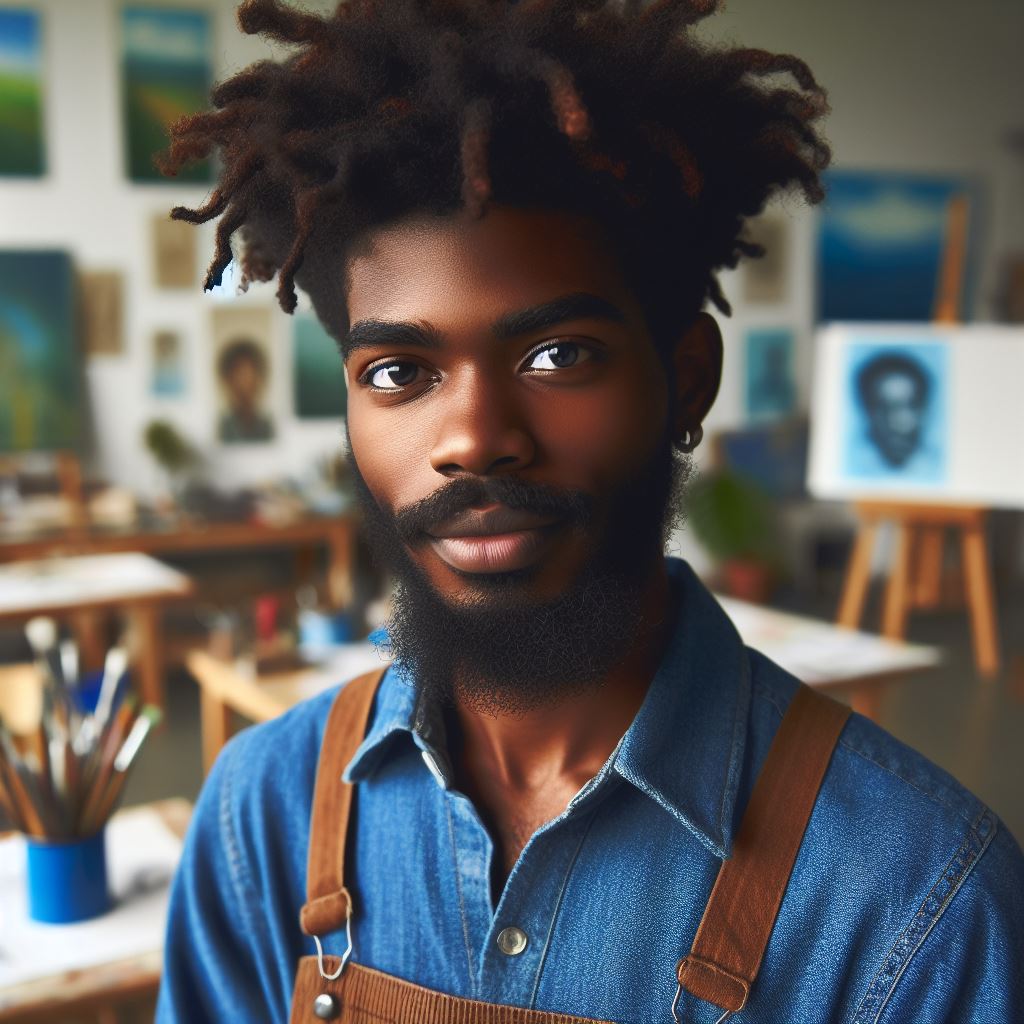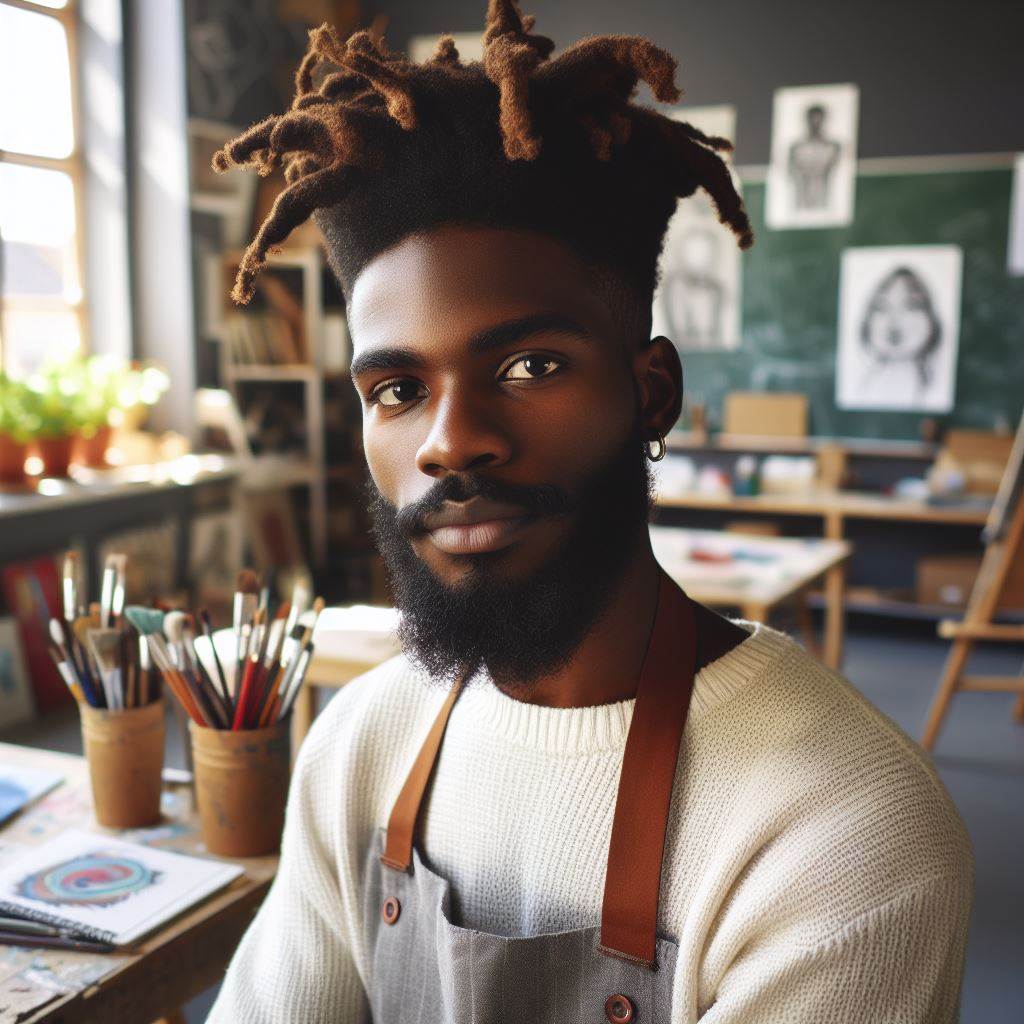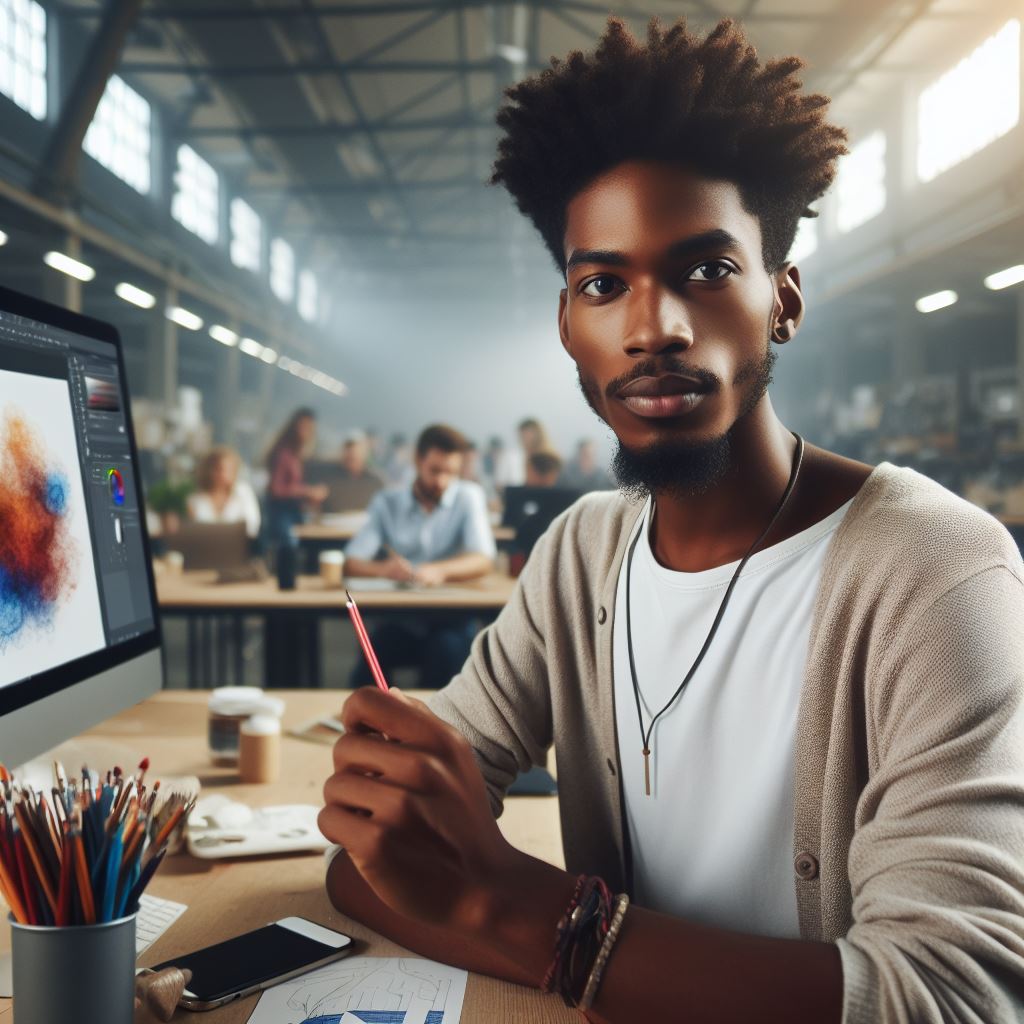Introduction
In Nigeria, the visual arts industry thrives, brimming with creativity, diversity, and rich cultural heritage.
Visual arts hold immense significance in Nigeria, serving as a mirror reflecting the nation’s history, values, and societal dynamics.
Starting a career in Nigerian visual arts offers a promising avenue for creative expression, cultural preservation, and economic empowerment.
Nigeria’s visual arts scene is a vibrant tapestry, woven with traditional practices and contemporary innovations.
From indigenous sculptures to modern digital art, the industry encompasses a wide spectrum of artistic forms and expressions.
Artists in Nigeria draw inspiration from their surroundings, blending tradition with modernity to create compelling narratives and thought-provoking pieces.
The importance of visual arts in Nigeria cannot be overstated.
Art serves as a conduit for storytelling, transmitting cultural narratives across generations and preserving heritage.
It fosters national identity and unity, celebrating the country’s rich cultural diversity while also addressing pressing social issues.
Through their works, Nigerian artists contribute to shaping public discourse, sparking conversations, and driving social change.
Choosing to start a career in Nigerian visual arts is a wise and viable option for aspiring artists.
The industry is ripe with opportunities for growth, recognition, and financial success.
With increasing global interest in African art, Nigerian artists have a platform to showcase their talent on both local and international stages.
Moreover, the digital age has opened new avenues for exposure and collaboration, enabling artists to reach wider audiences and explore innovative mediums.
In essence, embarking on a career in Nigerian visual arts holds immense potential for aspiring artists.
It offers a platform for creative expression, cultural preservation, and socio-economic empowerment.
With Nigeria’s rich artistic heritage and dynamic contemporary scene, the journey into the world of Nigerian visual arts promises excitement, fulfillment, and boundless opportunities for artistic growth.
Research and Education
Importance of obtaining a formal education in visual arts
Education plays a vital role in shaping a successful career in the field of Nigerian visual arts.
It provides aspiring artists with the necessary tools, techniques, and knowledge to excel in their chosen path.
Obtaining a formal education in visual arts offers a structured approach to learning that can help individuals develop their skills and creativity.
Researching different art schools and programs in Nigeria
When considering a career in Nigerian visual arts, it is essential to research the various art schools and programs available in the country.
Different institutions offer unique strengths and specializations, so it is crucial to find a program that aligns with your interests and career goals.
By exploring the options and comparing curricula, faculty, and facilities, aspiring artists can make informed decisions about their educational journey.
Attending workshops, seminars, and exhibitions to enhance knowledge and skills
Additionally, attending workshops, seminars, and exhibitions can provide valuable opportunities to enhance your knowledge and skills in the field.
These events allow artists to learn from experienced professionals, gain insights into industry trends, and network with peers and mentors.
By participating in these activities, aspiring artists can broaden their understanding of Nigerian visual arts and stay inspired and motivated in their careers.
Overall, investing in research and education is a fundamental step in starting a career in Nigerian visual arts.
By pursuing a formal education, researching available programs, and engaging in continuous learning opportunities, aspiring artists can lay a solid foundation for a successful and fulfilling career in the field.
Read: Prominent Nigerian Artists You Should Know
Building a Portfolio
When starting a career in the Nigerian visual arts field, one of the most important aspects to focus on is building a strong portfolio.
Your portfolio is essentially a visual representation of your skills, creativity, and artistic style.
It serves as a tool to showcase your best work to potential clients, galleries, or employers.
Diversity is Key
In order to make your portfolio stand out, it’s crucial to showcase a diverse range of artwork.
This includes different styles, techniques, mediums, and subject matters.
By demonstrating versatility in your work, you’ll be able to appeal to a wider audience and show off your creative abilities.
Traditional vs. Digital Art
It’s important to include both traditional and digital art in your portfolio.
Traditional art includes mediums such as painting, drawing, sculpture, and printmaking.
Digital art, on the other hand, involves creating artwork using digital tools and software.
By incorporating both types of art, you can demonstrate your proficiency in various techniques and mediums.
Regular Updates and Refinements
Your portfolio should be a dynamic and evolving collection of your best work.
Transform Your Career with Expert Guidance
Get personalized mentorship consulting that’s tailored to your unique path. Our expert advice is actionable and exclusive.
Get StartedMake sure to regularly update it with new pieces that showcase your growth and progress as an artist.
Remove any outdated or weaker pieces to ensure that your portfolio reflects your current skill level and creative vision.
By constantly refining your portfolio, you’ll be able to present yourself in the best possible light to potential clients and opportunities in the Nigerian visual arts industry.
Read: Top Nigerian Art Schools for Aspiring Artists
Networking and Collaboration
Networking and collaboration play a crucial role in building a successful career in the Nigerian visual arts industry.
By actively participating in events, joining relevant associations, and working with peers, artists can create valuable connections and opportunities for growth.
Attending Art Events and Exhibitions
Attending art events and exhibitions is a great way to meet fellow artists and engage with industry professionals.
These gatherings provide valuable networking opportunities and a chance to showcase your work to a wider audience.
By participating in these events, you can stay updated on current trends and developments in the industry.
Joining Art Associations and Communities
Joining art associations and communities allows you to connect with like-minded individuals who share your passion for art.
These groups often host workshops, seminars, and networking events that can help you expand your knowledge and skills.
Being part of a supportive community can also provide emotional and professional support as you navigate your career in the visual arts.
Collaborating with Other Artists
Collaborating with other artists on projects can help you learn new techniques, gain insight, and broaden your artistic horizons.
Working with peers also enables you to combine strengths, share resources, and reach a larger audience with your creations.
By collaborating with artists from different backgrounds, you can create diverse and innovative artworks that resonate with a wider audience.
In fact, networking and collaboration are essential components of a successful career in the Nigerian visual arts industry.
By actively engaging with the community, attending events, and working with peers, artists can create valuable connections, expand their skills, and reach new heights in their artistic journey.
Read: How to Build a Successful Beauty Therapy Portfolio

Marketing and Branding
Marketing and branding are essential aspects of a successful career in the Nigerian visual arts industry.
As an artist, it is crucial to establish a unique personal brand and artistic style that sets you apart from others in the field.
Developing a Personal Brand and Unique Artistic Style
To start your career in Nigerian visual arts, focus on developing a personal brand that reflects your identity and values as an artist.
Your brand should be consistent across all platforms and artworks, creating a recognizable and memorable presence in the industry.
Additionally, developing a unique artistic style is crucial for standing out in a competitive market.
Experiment with different techniques, mediums, and subjects to find your signature style that resonates with your target audience.
This will help you build a loyal following and attract potential clients who appreciate your work.
Utilizing Social Media Platforms
In today’s digital age, social media has become a powerful tool for artists to showcase their work and connect with potential clients.
Platforms like Instagram, Facebook, and Twitter allow you to reach a wider audience and engage with art enthusiasts from around the world.
Post regularly on social media, sharing behind-the-scenes glimpses of your creative process, finished artworks, and upcoming projects.
Engage with your followers by responding to comments, hosting live sessions, and collaborating with other artists to expand your reach and build a supportive community.
Creating a Professional Website or Online Portfolio
A professional website or online portfolio is a must-have for any artist looking to attract commissions and opportunities in the Nigerian visual arts industry.
Your website serves as a digital storefront where potential clients can view your portfolio, learn more about your artistic journey, and contact you for collaborations or purchases.
When creating your website, ensure it is visually appealing, easy to navigate, and showcases your best work prominently.
Include a detailed bio, contact information, pricing details, and a blog or news section to keep visitors updated on your latest projects and exhibitions.
Regularly update your portfolio with new pieces to show your growth and versatility as an artist.
In general, marketing and branding play a significant role in establishing a successful career in Nigerian visual arts.
By developing a strong personal brand, utilizing social media platforms effectively, and creating a professional online presence, you can attract clients, opportunities, and recognition in the competitive art industry.
Stay true to your artistic vision, engage with your audience authentically, and seize every opportunity to showcase your talent and creativity.
Read: Natural Beauty Therapy Methods Popular in Nigeria
Learn More: Benefits of Learning European Languages in Nigeria
You Might Also Like: Student Life: Studying English Language in Nigeria
See Related Content: The Future of Communication Studies in Nigeria
Seeking Opportunities
When starting a career in Nigerian visual arts, seeking opportunities is crucial to building a successful career.
Here are some key ways to seek opportunities in the industry:
Applying for Artist Residencies, Grants, and Funding Opportunities
Artist residencies provide artists with the time and space to focus on their craft without distractions.
Research and apply to artist residencies both locally and internationally to broaden your artistic horizons.
Additionally, explore grant opportunities to secure funding for your projects and artistic endeavors.
Submitting Work to Art Galleries, Exhibitions, and Competitions
One of the best ways to gain exposure and recognition in the Nigerian visual arts scene is by submitting your work to art galleries, exhibitions, and competitions.
Participating in group shows and competitions can help you connect with other artists, collectors, and art enthusiasts.
Keep an eye out for open calls and submission deadlines to showcase your work.
Seeking Mentorship from Established Artists in the Nigerian Visual Arts Industry
Mentorship plays a vital role in the growth and development of emerging artists.
Reach out to established artists in the Nigerian visual arts industry for guidance, advice, and mentorship.
Building a relationship with a mentor can provide you with valuable insights, feedback, and opportunities to expand your network within the industry.
By actively seeking opportunities such as applying for artist residencies, grants, and funding opportunities, submitting work to art galleries, exhibitions, and competitions, and seeking mentorship from established artists in the Nigerian visual arts industry, you can pave the way for a successful career in the vibrant and dynamic world of Nigerian visual arts.
See Related Content: Nigerian Music Schools: Curriculum Overview
Explore Further: Mass Communication and Public Relations Nigeria
Gain More Insights: Strategic Planning and National Development in Nigeria
Learn More: Language Proficiency for African and Asian Studies
Building a Sustainable Career
Building a sustainable career in the Nigerian visual arts industry requires a strategic approach to generating income and advancing one’s skills.
Here are some key steps to consider:
Diversifying Income Streams
One way to ensure a stable income in the visual arts field is to diversify your revenue streams.
In addition to selling your artwork, consider offering art classes or workshops to educate others.
You can also create and sell merchandise such as prints, posters, or even merchandise featuring your artwork.
This approach not only expands your revenue sources but also exposes your work to a broader audience.
Creating a Business Plan
Developing a business plan is essential for long-term success in the visual arts industry.
Outline your goals, target market, pricing strategy, and marketing plan to guide your career growth.
Setting both short and long-term goals will help you stay focused and motivated as you navigate your career.
Regularly reviewing and updating your business plan is crucial to adapting to market changes.
Investing in Professional Development
Continuous learning and professional development are essential to staying relevant in the competitive visual arts industry.
Attend workshops, seminars, and courses to enhance your skills and knowledge.
Networking with other artists, professionals, and industry experts can provide valuable insights and opportunities for collaboration.
Investing in your education and skill development will help you evolve and succeed in the ever-changing art world.
Conclusion
Starting a successful career in Nigerian visual arts requires dedication, perseverance, and hard work.
Aspiring artists should pursue their passion relentlessly and stay committed to their craft.
It is essential to constantly seek opportunities for growth and improvement, whether through formal education or self-study.
Creativity plays a crucial role in the industry, so artists should always strive to innovate and push artistic boundaries.
Despite the challenges that may come their way, aspiring artists should remain resilient and never give up on their dreams.
Building a career in the visual arts industry may take time, but with persistence and determination, success is achievable.




